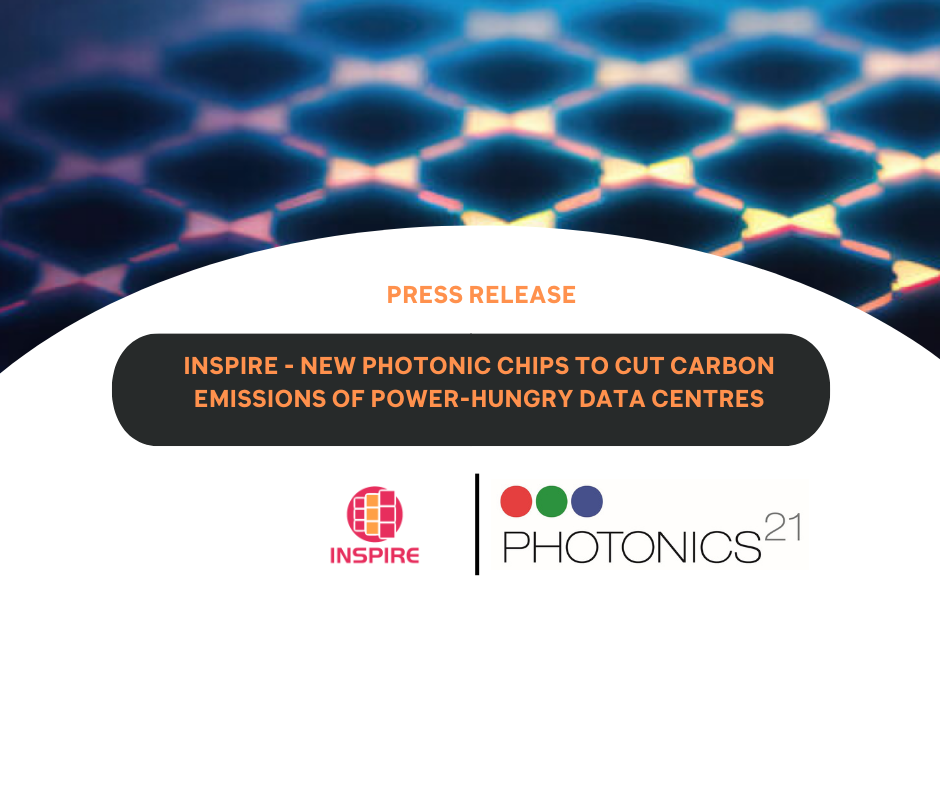
Photonics21: INSPIRE makes a world-first, best-in-class PIC manufacturing platform to enable several mega markets
On 18 December 2023, Photonics21 published a press release entitled “INSPIRE – New photonic chips to cut carbon emissions of power-hungry data centres”
You can access the full press release on Photonics21 website.
Furthermore, INSPIRE has attracted journalistic interest by showcasing the achievements, and by demonstrating the potential of optical technologies to solve Europe’s societal challenges. Three articles in French language were published in the following media:
Press release:
Data centres that keep our Instagram, Facetime, and Zoom running can become more climate-neutral thanks to a new set of chips that use light instead of electricity. These new data centre ‘switches’ can produce a significantly lower impact on the environment with increased bandwidth and reduced heating.
A group of European scientists is working to make scalable and energy-efficient data centres with their new photonic integrated circuits – or ‘PICs’.
PICs are similar to traditional electronic integrated circuits (ICs), like those found on a home computer motherboard. However, PICs use light instead of electricity to perform sensing, communication and data processing and play a crucial role in the high-speed connections inside data centres.
Data centres process and store huge swathes of digital information every day to ensure our cloud computing, social media, and online gaming can run smoothly – consuming more than 3% of the world’s power and accounting for 2% of global emissions.
These facilities generate heat and greenhouse emissions and are responsible for 15% of the IT sector’s carbon footprint. Meanwhile, these centres contribute to 18% of digital pollution caused by the production, use, and disposal of electronic devices and data.
Called INSPIRE, the € 4.9 million EU-funded project is developing advanced data centre ‘switches’ built on PICs that will offer higher speed and bandwidth, generate less heat and require less cooling than existing technologies.
The technology comes at a fortuitous time when the data centre industry is under pressure to ensure Europe meets its goal of making these facilities climate-neutral by 2030. Under the new and improved European Energy Efficiency Directive (EED), data centre operators over a capacity of 500 kW must disclose their 2023 energy performance by 15th May next year.
Project coordinator Professor Martijn Heck said: “The INSPIRE project brings together a multidisciplinary team of experts. This project is developing a key-enabling technology that has multiple use cases for a suite of different applications.
In addition to our data centres switches that will deliver higher bandwidth, lower latency and more energy efficiency, we are working on two other demonstrator cases that have been carefully chosen for representing large markets – a distributed fibre-sensing readout unit and a microwave photonic radio-frequency pulse generator.
We are developing lasers for fibre sensors in infrastructure where we are working on low-cost, ubiquitous optical chips for sensing solutions. With the microwave pulse generator, we are developing photonics technologies to increase the performance of wireless technology in 5G and future 6G communications to make higher bandwidth wireless communications.”
Supercharging EU Pilot Lines
The project is working to make its own small-scale fabrication line that serves as a testing ground for its new semiconductor technologies, processes, and products before full-scale production in a fab.
“We are making a world-first, best-in-class PIC manufacturing platform to make the wafers. We will align our in-house production capabilities with photonics industry clusters through JePPIX, ePIXfab and the EC manufacturing pilot lines.
The ultimate goal is to transfer our fabrication capabilities to an industry Pilot Line and grow them into a commercial setting, so the technology becomes accessible for end-users,” Professor Heck said.
European Technological Sovereignty
While establishing and running a semiconductor pilot line and eventual fab will take significant investment and expertise, Heck sees the long-term potential benefits in terms of technological independence, economic impact, and strategic advantages for Europe:
“By owning the entire process of developing semiconductor chips, from design to manufacturing, we can enhance our strategic autonomy by not having to rely on companies outside of Europe for critical components and technologies.“